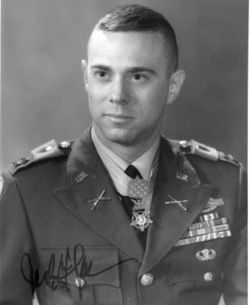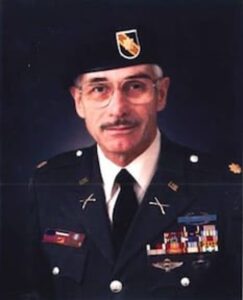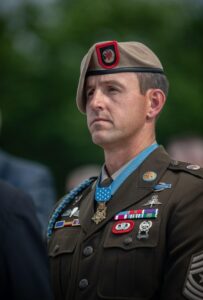Recipient: Jack Howard Jacobs
Branch: U.S. Army
Combat: Vietnam War
Jack Howard Jacobs was born on August 2, 1945, in Brooklyn, New York. The son of second-generation Eastern European immigrants, he grew up with a full appreciation of their Jewish culture and the importance of education. As a child, he moved with his family to Woodbridge Township, New Jersey, a nearby suburb, where he finished high school and enrolled in Rutgers University under the ROTC program.
Jacobs proved to be a dedicated and ambitious student, earning both a Bachelor of Arts and a Master of Arts degree before graduating in 1966. He was initially commissioned to join the U.S. Army as a second lieutenant and wanted to deploy to Vietnam with his unit, the 82nd Airborne. Instead, he was assigned only as an advisor. When Jacobs protested, insisting he wanted to be an infantry soldier, he was told that his education made him “uniquely qualified” to advise infantry units in the Army of the Republic of Vietnam.
It was in this position that he would risk life and limb during an enemy ambush in Kieng Phong Province on March 9, 1968.
On That Day: Honor In Action
After chasing and exchanging gunfire with enemy units for two months in the Mekong Delta region, the Province Headquarters received intelligence identifying the location of the enemy’s operating base. The Americans hoped to mount a large-scale coordinated attack to trap the enemy, with Jacobs’ battalion moving in from the south while a second battalion came in from the east.
What they didn’t know was that enemy informants had infiltrated Province Headquarters—and they quickly warned the Viet Cong forces of the planned operation.
With time to prepare before the two American-led battalions arrived, the enemy fortified themselves in trenches and executed an enormous, surprise ambush on the ground forces. Mortar explosions and a relentless rain of machine gun fire killed or wounded nearly 100 men in a matter of minutes.
Then-Lieutenant Jack Jacobs was one of the many struck by mortar fragments. Bleeding, but still alive, Jacobs witnessed the mission collapsing before his eyes as heavy casualties caused the unit to fracture into disarray. With his commanding officer wounded nearby, Jacobs called for air support, directing strikes on the enemy. He was losing blood quickly and watched as the entrenched Viet Cong’s fierce gunfire drove off United States air fighters. As the panic mounted around him Jacobs decided that he was, perhaps, the only man left who was not incapacitated— and therefore the last man capable of saving the remaining battalion members.
In a recent interview, Jacobs recounts that moment. “It’s a throwback to an old line from Hillel, the first-century Talmudic scholar, who said, basically, ‘If not you, who? And if not now, when?’ And I thought that if I didn’t do something, nobody else could, and I better do something. And so I did.”
Valor in the Face of Enemy Ambush
Despite a serious head injury that left his vision impaired, Jacobs took command, ordering his men to withdraw from their exposed position to establish a more secure defensive line. Under intense fire, Jacobs returned to the combat zone to rescue a seriously wounded advisor, administering life-saving aid under the protection of nearby woods.
Again and again, he ran completely exposed through a blaze of bullets across rice paddies to save the lives of his wounded company commander and twelve more allied soldiers. Soon, the enemy began to emerge from their bunkers. For hours, Jacobs single-handedly fought off and dispersed multiple Viet Cong squads while protecting the wounded masses on his defensive perimeter.
Leaving a Legacy of Sacrifice and Service
Jacobs was promoted to captain and was awarded his Medal of Honor by President Nixon during a grand ceremony on the White House lawn, after which he returned for a second tour in Vietnam. He honored his family’s belief in the importance of education by becoming a professor himself. Jacobs taught as a faculty member at both The U.S. Military Academy at West Point and The National War College in Washington, D.C. before retiring from the Army as a colonel in 1987.
After his military career, Jacobs built a successful civilian career in investment banking and even wrote a memoir published in 2008 titled If Not Now, When: Duty and Sacrifice in America’s Time of Need. His book went on to win the 2010 Colby Award, which recognizes “a first work of fiction or nonfiction that has made a significant contribution to the public’s understanding of intelligence operations, military history, or international affairs.”
Colonel Jacobs is currently a military analyst for NBC/MSNBC and remains actively involved in several military-related organizations, including serving on the Board of Directors for the National Medal of Honor Museum.




